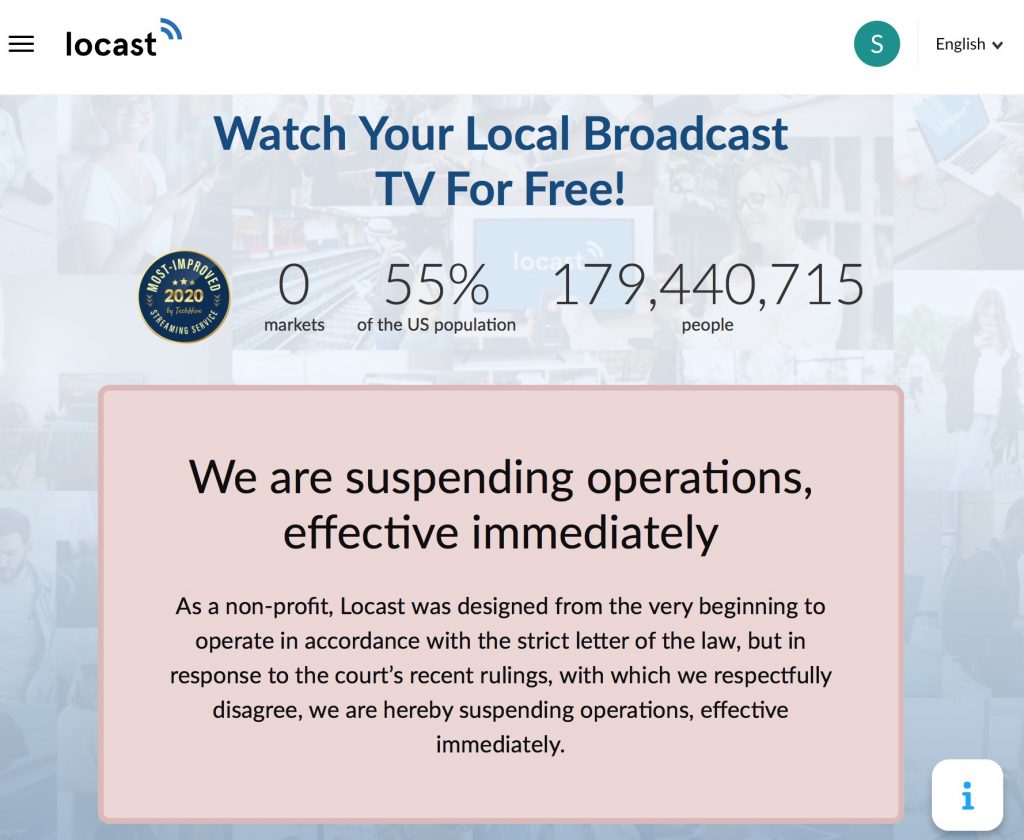
On September 1, The US District Court of the Southern District of New York decided in favor of plaintiffs – the four major US broadcast television networks, NBC, CBS, ABC and Fox – that the nonprofit local TV distributor Locast was violating copyright law.
On September 1, Locast responded by soliciting subscriber donations, and then on September 2, accepted one of the remedies requested by the plaintiffs and affirmed by the judge, by shutting down altogether.
Why it happened
Organized as a non-commercial 501(c)(3) non-profit public service Locast was funded by voluntary donation. Locast depended upon an exemption granted in copyright law to organizations that redistribute programming which take contributions which don’t exceed the cost of operations and maintenance. However, Locast took in more than $4 million while its operational expenses were about $2.4 million. AT&T supported Locast’s mission by donating $500,000 to Locast in 2019. Other companies contributed too.
Locast explained: “The court concluded that by interrupting programming to ask users for donations, and by suspending those interruptions based on whether a user makes contributions, Locast actually was charging a fee, not merely seeking a voluntary contribution… The court then concluded that revenues Locast collects in this manner exceed the cost of operating the service because funds are used to add new markets, rendering Locast ineligible to use the copyright exemption for non-profits (17 U.S.C. 111(a)(5)).”
Locast founder David Goodfriend is no outsider. According to one court document, “Mr . Goodfriend worked in various government roles. After leaving government service, he spent seven years at DISH Network where he worked in television and multichannel video programming distributor (“MVPD” ) regulation. From 2006- 2009 , Mr . Goodfriend served as the Vice President of Law and Public Policy at DISH. Following his employment at DISH, Mr . Goodfriend joined Emmer Consulting, where he represents various companies and organizations involved in telecommunications, and in 2009, he founded Sports Fans Coalition (“SFC”), a nonprofit organization focused on the rights of sports fans” (which is the company entity that operated Locast).
In addition to shutdown, the plaintiffs plea for damages, the defendent’s profits (or maximum statutory damages), attorney’s fees, “other amounts as may be proper pursuant to (US code),” and further relief deemed proper by the court.
Locast is expected to appeal.
Read the court decision (Case number 1:19-cv-07136, US District Court of the Southern District of New York)
Read the 2019 complaint (ibid)
Read how Locast came to be (The New York Times – Paywall)
Why it matters
Is Locast a pirate? With this decision, and because piracy is defined as distribution without a license under copyright law, their opponents can position Locast as such on a technicality. The finding that Locast has taken in more than it has spent on operations and maintenance, is in effect interpreted as disqualifying Locast from nonprofit status.
But shouldn’t it be possible to reach some form of agreement that satisfies consumers that can’t receive local television without Locast? In fact, because Locast is distributing programming that is already free-to-air, should there even be an issue?

“Deja vu all over again.” – Yogi Berra
The Locast case is similar to that of Aereo about 8 years ago. Aereo was a startup that deployed over-the-air antennas to collect broadcast TV in local markets (One example: antenna banks in the Empire State Bldg in NYC), and then distribute it over the Internet to subscribers in those local markets. Each subscriber paid a monthly fee, was assigned a dedicated antenna, and the service transcoded it into unicast-over-IP to that subscriber. Major TV broadcast networks contended that Aereo qualified as a distributor, sued for copyright infringement, won, and Aereo was shut down.
In 2019, Public Knowledge said that “it doesn’t make any more sense for Aereo to be violating copyright by renting out antennas than it does for Radio Shack to be in violation for selling those antennas out of its storefront.” Public Knowledge notes that its policy director sits on the Board of Sports Fan Coalition, Locast’s company entity.
But was there an additional incentive?
Under the framework of the 1992 Cable Act, programming distributors must be granted consent by broadcasters to carry their programming, and today, that means paying a retransmission fee as part of obtaining consent. According to the American Television Alliance, retransmission fees went from about $200 million in 2006, to $10.1 billion in 2018; an increase of 4,950 percent.
This is separate and additional to revenues received from advertisers; a business model honed over more than 70 years of television history.
Can’t we all just get along?












